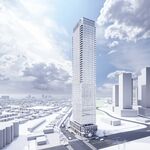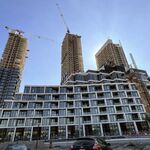RC8
Senior Member
Wait, 2 additional highways going downtown AND a bunch of new subway/LRT lines? I'd actually be quite pleased with that. The Spadina expressway didn't happen because it required the complete destruction of mature neighborhoods. But replace 'mature neighborhoods' with 'rows of derelict mud-brick houses without electricity or plumbing' and the calculus would change considerably.
Anyway, I'm a paid wumao, have to earn my dinner somehow, so here's my reply to your comments. It is true that China's earliest cities to modernize had misguided policies and built too many ring roads, as well as roads that were too wide. Unfortunately, the rest of your comments do not reflect reality or any real life facts. Chinese decision-making, if anything, can be characterized as too orderly, too top-down, and with not enough respect for grassroots opinions. Basically, the opposite of what you've described. Furthermore, your claim that Chinese construction workers are not paid a fair wage is frankly laughable, given the trend in blue collar wages there.
I grew up watching dirty, chaotic, backwards Chinese cities build themselves into modern metropolises. Before there were so-called 'disastrous highways into downtown' and 'inhumane subways built by slave labor', people got around on donkey carts, crush-load minivans and cycling, often on unpaved dirt roads. Too wide roads that favor the automobile are still better than no roads at all. You never had to live there, you don't understand that five years of delay due to public consultation and environmental assessment meant five more years of backwardness. In the past, to visit my grandmother, I'd have to ride a donkey cart for 30 minutes to go from the train station to her house, and she lived in a town of 200,000 people. That part of town now has a paved road, donkey cart ride is replaced by a 5-minute cab ride, and a high speed rail link is being built. Perhaps you think I should still ride a donkey cart the next time I go see her.
The point is, China had built all this infrastructure very quickly because she was backwards and poor, and there was a real sense of urgency. They have built entire road networks and subway systems in a span of 20 years, without bankrupting their cities. You might scoff at that, but I think that's an inspiration to developing countries around the world. Despite some misguided projects and accidents due to hasty planning and construction, the net effect of this transformation has led to a major improvement to peoples' lives. This is why, in my opinion, to call the transformation of Chinese cities an 'urban catastrophe' is an insult to the 500 million Chinese people who live in cities.
Toronto today has about 70 km of higher-order transit. I did a regression study a while back, compared to the world average, a city of Toronto's size, density and prosperity should have 142 km of higher-order transit. The reality is the transit here is at least 30 years behind. If you don't want to learn from China, that's fine, but so far Toronto has not learned from ANYONE. And don't blame Rob Ford, he is a symptom but not the disease. The fact that one single politician can cancel existing transit plans on a whim is the real problem, and maybe you should ask Londoners how they'd tackle this issue.
'Top-down' in the Chinese case does not mean listening to experts - it means listening to relatively qualified people who defend the interests of an entitled elite, even when it entails going against the advice of serious experts.
What has happened in China is an urban catastrophe because many modern Chinese cities had the potential to become the greatest cities in history. Instead, they blew it, and now air is essentially unbreathable in all major cities (dwell into the peer-reviewed public health literature regarding the impacts of air pollution and you will see the magnitude of the disaster). Meanwhile, the pedestrian and transit experience is brutal as soon as you leave the downtown core of cities (and even there it's far from great).
Not all that was done was bad, of course. But here in Toronto we have very little to learn from the Chinese experience. All in all modern Chinese cities are utterly unsustainable and provide a very poor quality of life. Given the infrastructure to support these cities is all very recent and - as you point out - wasn't cheap, this is awful.
My friend from Shanghai recently travelled to a Chinese city he remembered as a very rural and peaceful (and backwards) back in time (name escapes me). Now pollution is thick, noise from traffic is everywhere, crossing the street is a chore. "The price of progress", he said, as he pointed out it looked less poor today.
While I am in no way advocating for leaving things the way they were, you need to realise that this 'one or the other' false dichotomy of underdeveloped miserable place vs. polluted city with ridiculously high rates of traffic accidents is nonsense. With the budgets allocated and the expertise available around the world, Chinese authorities could have helped cities develop in much more intelligent and sustainable ways. To this day they refuse to do so, as far as I understand.
I've lived in a number of developing world cities (and my family lived in Beijing back in time) and have had to deal with similar issues first hand. I have seen time and time again how the advise of experts is discarded when authorities are told they'll have to drive less. In Shanghai less than 20% of people drive a car to go places, yet 90% of public space is allocated mostly to car drivers. Transit lines are built when they are way overdue and then service is kept at levels that guarantee excessive crowding at peak hours. Barriers are erected to prevent people from crossing streets, rather than measures put in place to slow down traffic.
In Toronto I happily ride my bicycle or take a streetcar to get things done. It's not a perfect situation here, but it sure as hell is much nicer and easier than in most developing world cities with 20 subway lines.
P.S. the bit about fair-wages was referring to ksun's comments, not to any conditions I know of in China.
Last edited:




